I say this in the above video but before I dive in today, I want to thank each and every one of you for being here this year. Paid or not, I appreciate your presence immensely.
Right now Substack is offering gifted subscriptions - a cute idea for anyone you think may enjoy Fae Wolfe!
To begin, a mood board that feels very resonant right now. Think of this as a visual appetizer.


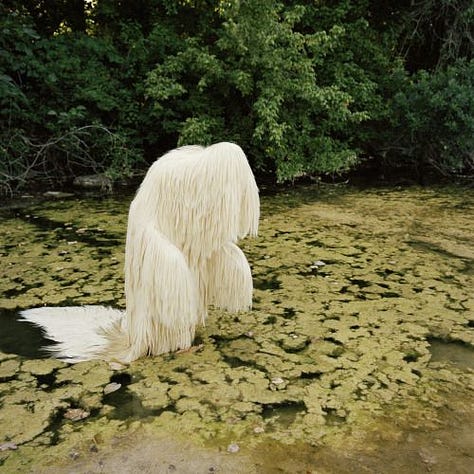
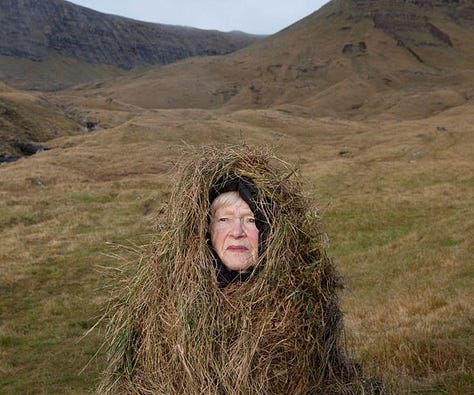
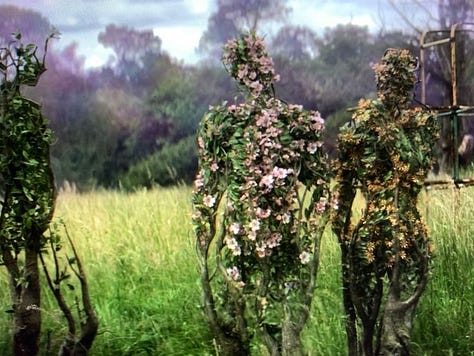



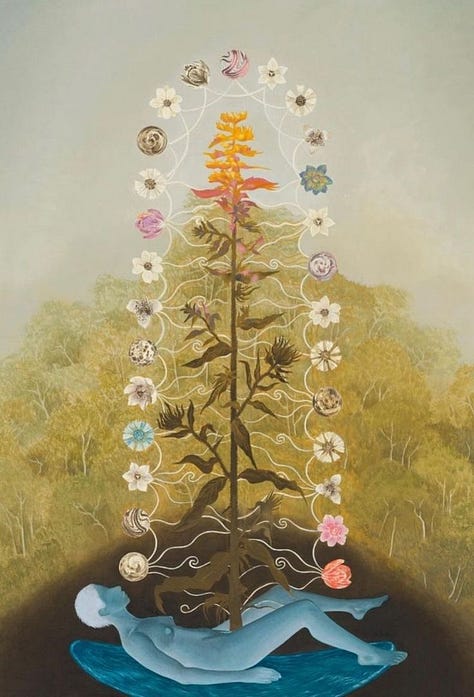
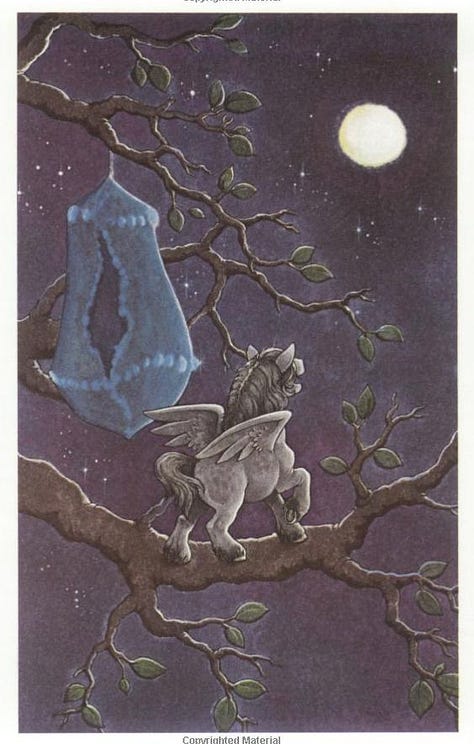
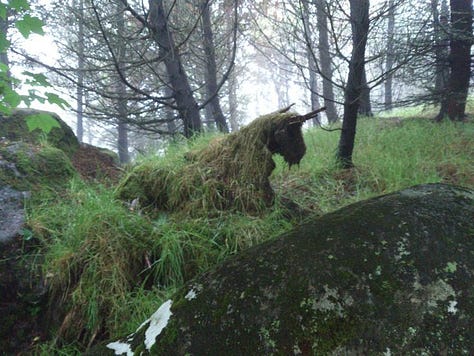

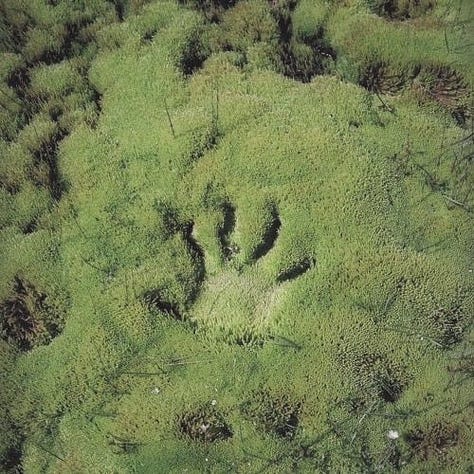
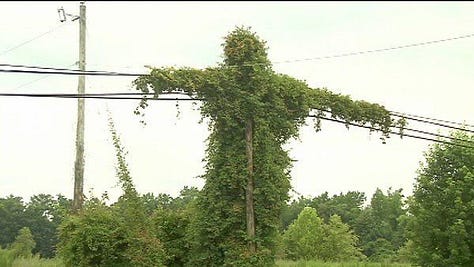




2024 in the rearview
Aging, time and merging with that which surround me (moss lady, not boss lady)
Each ending of the calendar year feels especially profound for me because it also includes my birthday. This year, on the 28th of December, I turn 41. I don’t know where 40 went, it is sort of like I misplaced it - I have that eerie feeling that something which I thought was safely tucked away in my pocket slipped out and now is resting quietly in a snowbank, a vast brilliant void, only to be revealed in the spring thaw. But what has been lost, misplaced? Has it actually been lost? Does it even want to be found again, or does it have a sense of belonging with the great beyond, does it desire to become one with the earth?
I’ve heard (mostly from my parents) that the concept of time in aging is accelerated, like sitting atop of a rocket pack that jettisons you faster and faster out of the atmosphere. My dad loves talking about this at any opportunity, mostly because he’s always astonished by it. Well, dad - count me as astonished, too.
I recall being four or five years old - or whatever age you are when you’re about to go into grade one - it was summer. I’d finished Kindergarten, and was deep in the slow honey drip of time. It ached, it squeezed, the torpor was excruciating. I’ve never been a big fan of school but as a young sensory seeker I was a big fan of not being bored - and the balmy days of summer with the screeching cicadas and rolling thunder wore out my little bones. I know now why time seemed to crawl when I was little: I was present. Fully present. I was exploring my world, noticing every detail, I was merging with everything I took in with my keen senses. I was feverishly, frantically absorbing every drop of life like I was a tiny yet porous sponge - and that made time sloooowww all the way down.
Succinctly, I was fast, but time was slow because I was present.
Nowadays, I am slow but time is fast because my presence is still splintered. I am mostly in my cocoon but the process is yet incomplete. There still seem to be negotiations happening, which is keeping a couple of limbs out of the hermetic seal.
And isn’t that what adulthood is all about? A constant stream of negotiations about attention, money, desire, shoulds, obligations, and time itself?
A pre-destined portal
But I’ve come up against the threshold of a potent, tantalizing, yet frightening portal over this last year, and I’ve chosen to step in even though it is deeply unknown to me. I mean, what else can you really do in such times? You can attempt to deny the portal, walk away from it cursing; you can shield your eyes from the luminosity of it; you can attempt to circumvent it - but my guess is that it would grow to swallow you - just like all destinies do.


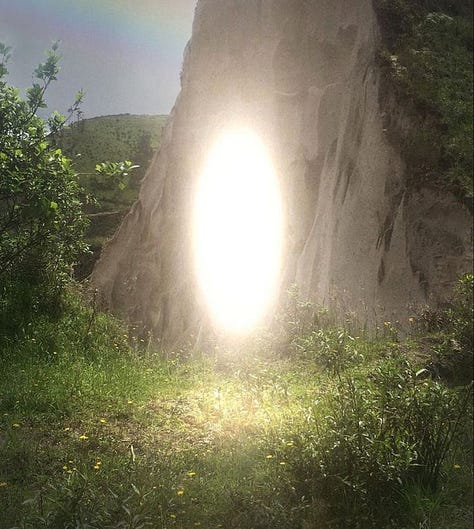
In January I was introduced to an agent - my first! - about writing a book. I have a couple of books in me, and I would like to see them be birthed at some point. But woof, did I ever feel anxious for a solid week after that meeting. She was very excited, and rapid-fired all of the steps it would take to get my first book out into the world. Each new fact - editor!-advance!-pleasing the publisher!-regular meetings!-fast writing timeline!-book tour! - felt like a bullet to my chest, and my heart slumped.
My intuition was saying no, nuh-uh, fuck no, do not, absolutely not, nope. Once I realized that this was the source of my worry, it subsided. I decided to take that as a cue and - for once in my fucking life - listen to what my body was telling me. I emailed the agent and said I wasn’t into doing the book right now. She was disappointed but said we could pick up the thread when I was ready. She said she understood - it was a wink wink, nudge nudge kind of moment like, “Yeah, perimenopause. I get ya.”
This was the first of many steps I took this year towards entering The Realm (unsure yet what to officially name it) on the other side of the portal threshold, and into the waiting arms of my cocoon. I honestly couldn’t believe that I did it, but the no felt so empowering. I realized I hadn’t really said it much in years - and as has been my theme du jour of late here on Substack - I had been quite the little people-pleaser. But not just that, though. For years I had been in a slipstream of yes because it was so damn exciting to have such a vast amount of opportunity. I was very much in a headspace of wanting to squeeze every last drop out of the well. It is SO tough to say no to what could be radical and impressive opportunities - but I had to wonder, why was I trying to impress anyone else except myself?
(Oh right, that pesky little self-esteem problem that was borne from being an undiagnosed autistic person, consistently ostracized and bullied simply for being herself, thereby leading to a frenetic and compulsive need to prove - and over-prove - herself.)
But the great and formidable beast of perimenopause would have no more of that.
Self-esteem vs self-compassion
If you’ve read Kristen Neff’s work on self-compassion, you’ll know this. There’s an important distinction between self-esteem and self-compassion - and it is that self-esteem is conditional whereas self-compassion is not. Self-esteem is often contingent upon having a certain set of personal, professional and relational pieces set in place - for example: a high-paying career, a healthy relationship, a ‘perfect’ figure. But what happens when - and it will be when - those things change, or are no longer a part of our lives? We tend to feel down on ourselves. A lot of it seems to point back towards that word I used earlier: impressive. We wish to be impressive to ourselves and others. When we aren’t, we feel less loveable and less worthy, overall. Our esteem plummets.
Self-compassion, on the other hand, is there for us where esteem is not - it is unconditional love, gentleness, softness, patience and understanding towards ourselves. Self-compassion is a late-diagnosed autistic’s best friend. It is fundamentally anti-ableist, anti-patriarchal and anti-capitalist.
In retrospect, I couldn’t have cracked open this egg of self-compassion without witnessing myself enter the portal, step over the threshold into The Realm and begin weaving my cocoon, observing as parts of me turn to primordial goo. The parts that don’t want to go the way of goo are the parts which are still caught up in being impressive, being ‘relevant’, being widely palatable, remaining in the spotlight, running roughshod over my natural cycles. I have been honouring those parts as it makes all kinds of sense to me why they’re still so insistent and loud, but I keep reminding them that this is not the way. “We go this way now.” I keep saying, sometimes aloud, their eyes looking up at me imploringly, like little children who want to stay and ride the ferris wheel one more time.
But what is the way? Where are we going?
Sometimes, it seems, we need to cast off from old shores without a compass, fully trusting that our body knows the way. Perimenopause - and the sacred rite of passage that I’m learning it is - was built into me from before I was born, when I was just a seed.
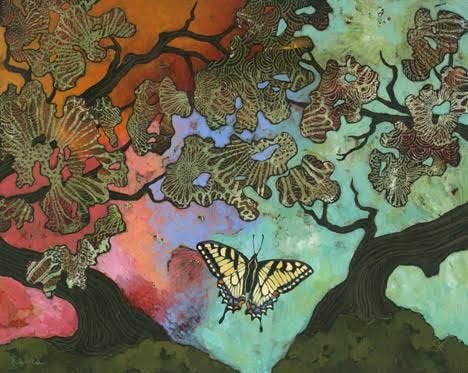

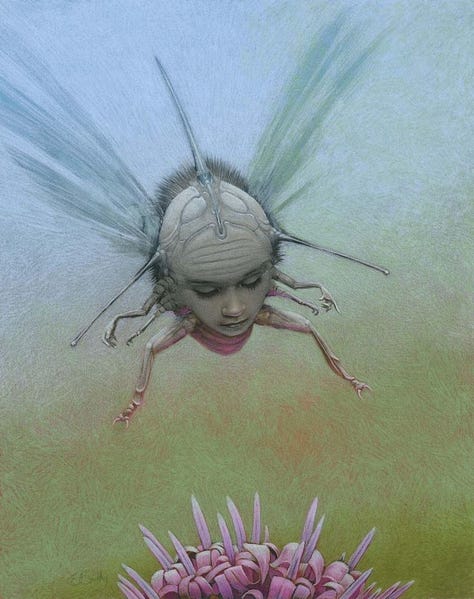
My body knows what to do. So where we are going - away from spotlights, from relevancy, from traditional (and ultimately ableist) notions of impressiveness - can only mean finding the quivering truth that lies precisely in the centre of my own soul.
So much of life thus far has been about seeking myself through the lens of other people. In the landscape of childhood all throughout early adulthood there is a desire to pulse in tandem with others, and to find belonging in this culture of ‘self through otherness.’ But it is a riot in that landscape, and one must take a step back - especially during rites of passage - to see and hear clearly. Are those other people’s voices, or my own? Is this my inherent navigation system, or an unconscious series of ‘shoulds’ unfolding in my nervous system?
Go forth and goo
As I pluck up the courage to pull my last bits into the cocoon and mulch myself into new form, I have a hunch that even though time won’t slow down to the honey-pace it was at when I was a child, I will find more presence. I feel that I’m (mostly) done fighting it - especially because of late I’ve learned that cocooning doesn’t mean not having desires, not being motivated, not letting the soft animal of my body love what it loves. All of that is alive and well. But it does mean that I no longer (and I mean really) push myself to be the same every day like patriarchal, capitalist, society pressures us all to do. It means that I honour my (now erratic) menstrual cycles and I allow my hormones and my body to dictate where and what I flow towards - or away from day by day. It means that I give myself a menu of activities to choose from. It means staying as much out of the spotlight as I can. It means practicing self-compassion over self-esteem. It means lining my cocoon with gorgeous tapestries, soft pillows, warm blankets, trust and imagination for what may come next.
I’ll leave you with some of my most popular articles this year.
Is it true love, or is it parasociality? Part one
Excerpt from “The Flies of the Marketplace” by Friedrich Nietzsche, Thus Spoke Zarathustra:
Autism Ed || Autistic Girls Are Little Psychologists
The other day someone asked me this on Instagram:
Until next time,
Love and wolves.
D xx
P.S. My Navigating Autism Late In Life course is on sale right now - 22% off with the code NEUROSPICY until December 31st.
What’s included:
If you have recently been diagnosed as autistic or suspect you may fall somewhere on the spectrum, this course offers a thorough explanation of the autistic mind, body and spirit that is deeply supportive. Instead of approaching the subject from an overly medicalized, pathologized standpoint, this course was written from the perspective of a late-diagnosed autistic woman who has spent the last 3 years immersed in researching this beautiful - but misunderstood - neurotype.
Here you will find insight and explanations into everything you could possibly want to know about autism:
the history of autism
a 165-point autism traits list
how our brains work
what it's like having a highly sensitive nervous system
why self-diagnosis is valid
impact of late diagnosis on mental health, physical health, employment and relationships
navigating autistic burnout
overcoming internalized ableism
what is autistic masking
unmasking tips
dealing with post-diagnosis emotions and identity crises
how to advocate for yourself and have your needs met
soothing sensory issues
emotional regulation tips
how to build a sensory cave
finding autistic joy
...and SO much more.
WHAT YOU WILL LEARN
My aim with this course is to supply you with all of the information you could ever need or want about your beautiful brain, so that you can love yourself exactly as you are - no ifs, ands or buts. Knowledge is power, and so is dispelling misinformation. We need to gently undo some internal narratives in order to make room for new ones. And we certainly focus on finding autistic joy so that we can feel fully embraced in this identity, and hopefully overcome some of the pain this life has caused us.
The course
56 modules, which you can complete at your own pace. You will have access to the course forever, so you can refer back to it time and again.
Course cost: 56.00 minus 22% during the sale duration
1% of sales of this course will be donated to PCRF - Palestine Children's Relief Fund.





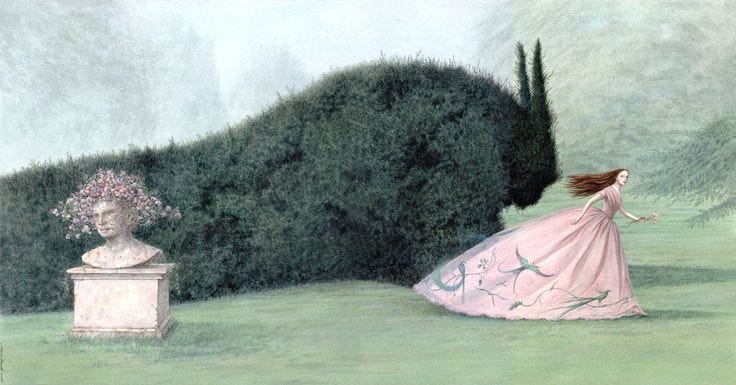



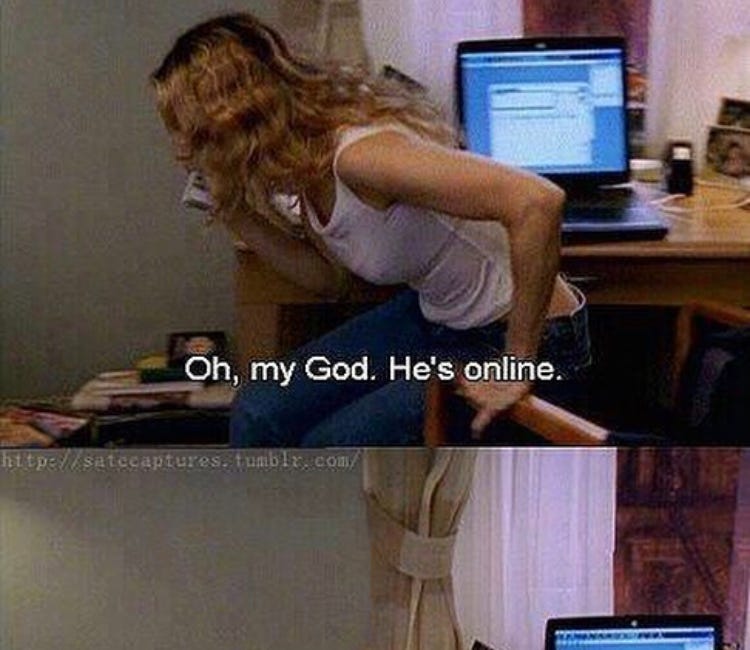



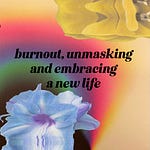






Share this post